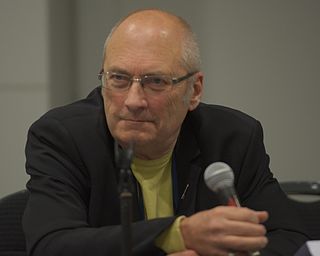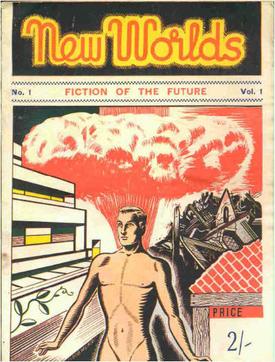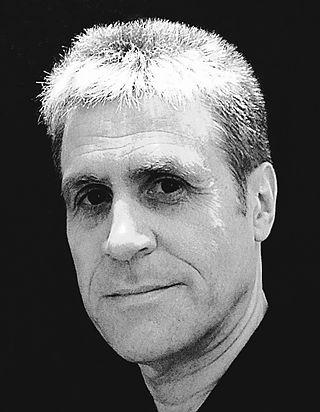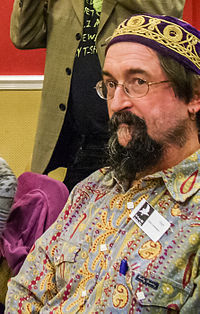
Michael John Moorcock is an English–American writer, particularly of science fiction and fantasy, who has published a number of well-received literary novels as well as comic thrillers, graphic novels and non-fiction. He has worked as an editor and is also a successful musician. He is best known for his novels about the character Elric of Melniboné, which were a seminal influence on the field of fantasy in the 1960s and 1970s.
The New Wave was a science fiction (SF) style of the 1960s and 1970s, characterized by a great degree of experimentation with the form and content of stories, greater imitation of the styles of non-science fiction literature, and an emphasis on the psychological and social sciences as opposed to the physical sciences. New Wave authors often considered themselves as part of the modernist tradition of fiction, and the New Wave was conceived as a deliberate change from the traditions of the science fiction characteristic of pulp magazines, which many of the writers involved considered irrelevant or unambitious.
David Zindell is an American writer known for science fiction and fantasy epics.

The Encyclopedia of Science Fiction (SFE) is an English language reference work on science fiction, first published in 1979. It has won the Hugo, Locus and British SF Awards. Two print editions appeared in 1979 and 1993. A third, continuously revised, edition was published online from 2011; a change of web host was announced as the launch of a fourth edition in 2021.
HarperCollins Publishers LLC is an Anglo-American publishing company that is considered to be one of the "Big Five" English-language publishers, along with Penguin Random House, Hachette, Macmillan, and Simon & Schuster. HarperCollins is headquartered in New York City and is a subsidiary of News Corp.
In American science fiction of the 1950s and '60s, psionics was a proposed discipline that applied principles of engineering to the study of paranormal or psychic phenomena, such as extrasensory perception, telepathy and psychokinesis. The term is a blend word of psi and the -onics from electronics. The word "psionics" began as, and always remained, a term of art within the science fiction community and—despite the promotional efforts of editor John W. Campbell, Jr—it never achieved general currency, even among academic parapsychologists. In the years after the term was coined in 1951, it became increasingly evident that no scientific evidence supports the existence of "psionic" abilities.

John Frederick Clute is a Canadian-born author and critic specializing in science fiction and fantasy literature who has lived in both England and the United States since 1969. He has been described as "an integral part of science fiction's history" and "perhaps the foremost reader-critic of sf in our time, and one of the best the genre has ever known." He was one of eight people who founded the English magazine Interzone in 1982.

Interzone is a British fantasy and science fiction magazine. Published since 1982, Interzone is the eighth-longest-running English language science fiction magazine in history, and the longest-running British science fiction (SF) magazine. Stories published in Interzone have been finalists for the Hugo Awards and have won a Nebula Award and numerous British Science Fiction Awards.

Science Fantasy, which also appeared under the titles Impulse and SF Impulse, was a British fantasy and science fiction magazine, launched in 1950 by Nova Publications as a companion to Nova's New Worlds. Walter Gillings was editor for the first two issues, and was then replaced by John Carnell, the editor of New Worlds, as a cost-saving measure. Carnell edited both magazines until Nova went out of business in early 1964. The titles were acquired by Roberts & Vinter, who hired Kyril Bonfiglioli to edit Science Fantasy; Bonfiglioli changed the title to Impulse in early 1966, but the new title led to confusion with the distributors and sales fell, though the magazine remained profitable. The title was changed again to SF Impulse for the last few issues. Science Fantasy ceased publication the following year, when Roberts & Vinter came under financial pressure after their printer went bankrupt.

New Worlds was a British science fiction magazine that began in 1936 as a fanzine called Novae Terrae. John Carnell, who became Novae Terrae's editor in 1939, renamed it New Worlds that year. He was instrumental in turning it into a professional publication in 1946 and was the first editor of the new incarnation. It became the leading UK science fiction magazine; the period to 1960 has been described by science fiction historian Mike Ashley as the magazine's "Golden Age".
David Pringle is a Scottish science fiction editor and critic.

Richard Calder is a British science fiction writer who lives and works in the East End of London. He previously spent over a decade in Thailand (1990–1997) and the Philippines (1999–2002).

Robert Paul Holdstock was an English novelist and author best known for his works of Celtic, Nordic, Gothic and Pictish fantasy literature, predominantly in the fantasy subgenre of mythic fiction.

Mythago Wood is a fantasy novel by British writer Robert Holdstock, published in the United Kingdom in 1984. Mythago Wood is set in Herefordshire, England, in and around a stand of ancient woodland, known as Ryhope Wood. The story involves the internally estranged members of the Huxley family, particularly Stephen Huxley, and his experiences with the enigmatic forest and its magical inhabitants. The conception began as a short story written for the 1979 Milford Writer's Workshop; a novella of the same name appeared in the September 1981 edition of The Magazine of Fantasy & Science Fiction.
Chris Beckett is a British social worker, university lecturer, and science fiction author. He has written several textbooks, dozens of short stories, and six novels.
Jayme Lynn Blaschke is an American journalist and author of science fiction, fantasy and related non-fiction. Primarily known for his genre-related interviews with authors and editors, he published a collected volume of 17 interviews, Voices of Vision: Creators of Science Fiction and Fantasy Speak, through the University of Nebraska Press in 2005. In 2016 he published an extensively-researched history of the infamous brothel that served as the inspiration behind The Best Little Whorehouse in Texas titled Inside the Texas Chicken Ranch: The Definitive Account of the Best Little Whorehouse.
Steven Paulsen is an Australian writer of science fiction, fantasy and horror fiction whose work has been published in books, magazines, journals and newspapers around the world. He is the author of the best selling children's book, The Stray Cat, which has seen publication in several foreign language editions. His short story collection, Shadows on the Wall: Weird Tales of Science Fiction, Fantasy and the Supernatural), won the 2018 Australian Shadows Award for Best Collected Work, and his short stories have appeared in anthologies such as Dreaming Down-Under, Terror Australis: Best Australian Horror, Strange Fruit, Fantastic Worlds, The Cthulhu Cycle: Thirteen Tentacles of Terror, and Cthulhu Deep Down Under: Volume 3.

Take Back Plenty (1990), is a novel by British writer Colin Greenland, which won both major British science fiction awards, the 1990 British SF Association award and the 1991 Arthur C. Clarke Award, as well as being a nominee for the 1992 Philip K. Dick Award for the best original paperback published that year in the United States.
The Entropy Exhibition: Michael Moorcock and the British 'New Wave' in Science Fiction is a book by Colin Greenland published in 1983.
Judith Clute is a Canadian painter, graphic designer, print-maker, and illustrator who has created cover art and illustrations for a number of well-known science fiction authors and magazines. Clute has British citizenship and works in London. She is also a tour guide with the Original London Walks.










